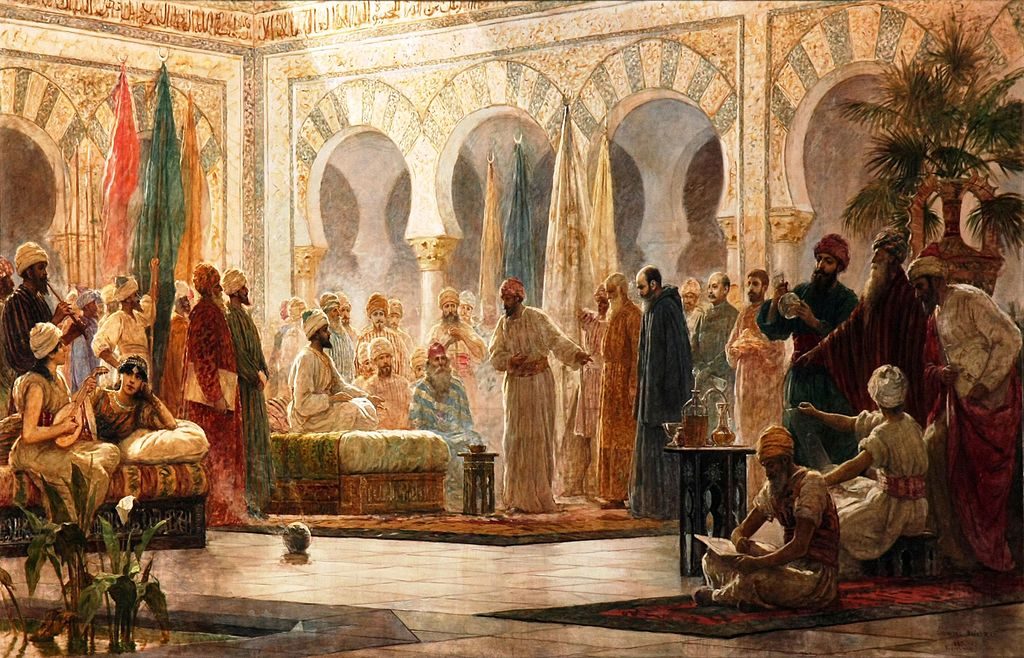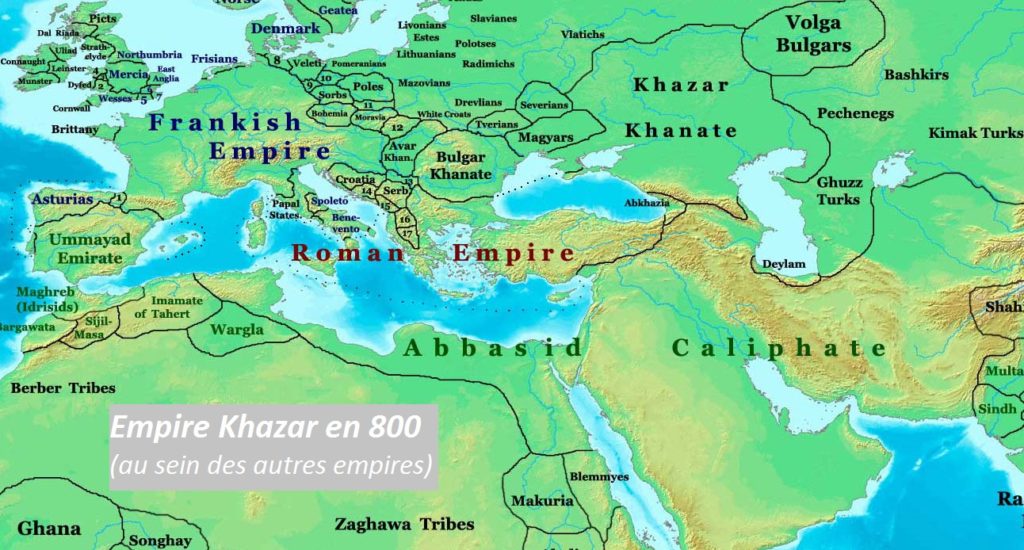
910 AD to 930 AD, Psalm 93: Khazars.
This site was first built in French (see www.147thgeneration.net). The English translation was mainly done using « google translation ». We have tried to correct the result of this translation to avoid interpretation errors. However, it is likely that there are unsatisfactory translations, do not hesitate to communicate them to us for correction.
(for that click on this paragraph)
Summary
This generation is from the years 910 AD to 930 AD.
According to our count, this generation is the 93rd generation associated with Psalm 93. It is in this Psalm 93 that we therefore find an illustration of the facts of this generation.
To this generation emerges the Fatimids, whose name derives from Fatima. This new dynasty gradually encroaches on the Abbasid lands. In Cordoba, this generation is marked by the beginning of the reign of Abdar Rahman III (912-962) which puts an end to a period of unrest and initiates a new golden age. The Carolingian Empire or what remains of it continues to fall apart.
This emergence of Saadia Gaon is beneficial to Judaism who succeeds in confirming its faith and tradition despite the resurgence of Greek thought and rationalism, against which traditional exegesis would have been insufficient.
Politically, for most known empires, this generation is a transitional generation. The old empires falter as the futures begin their gestation. During this parenthesis, it is the peoples of the rivers that mark this generation.
The Khazars assert themselves as an unavoidable force between the Byzantine Empire and the Arab Empire against which they also knew how to play on equal terms. Conscious of the role they can play among the Byzantines and the Arabs, They decided to adopt a monotheistic religion. To maintain their independence, they adopted the oldest of the monotheistic religions, Judaism, already widespread in the region.
Khazaria became at the beginning of the 10th century a perfect model of coexistence between religions. Although the tenth century will see the end of the Khazar Empire because of its growing military weakening, during the generation that interests us, the Khazars still know how to defend themselves.
It is on this reputation, that Hasdai Ibn Chaprut a few years later (in 958) will try to get in touch with Khagan Khazars king to know a little more about this Jewish kingdom that made Jews dream in exile.
Talk
Fatimids
In Cordoba, this generation is marked by the beginning of the reign of Abdar Rahman III (912-962) which puts an end to a period of unrest and initiates a new golden age. All the more easily since the civil war that preceded it has exhausted all the protagonists who are tired of suffering the disastrous consequences and are ready to submit to regain a certain order.
Abdar Rahman surrounds himself with brilliant men, for Jews this is the opportunity to appear for the first time in decision-making roles of the highest order (This will be especially true in the next generation).
To this generation emerges the Fatimids, whose name derives from Fatima, the daughter of Muhammad and Ali’s wife, whose Fatimid caliphs claim to be descended. This new dynasty gradually encroaches on the Abbasid lands, the conquest first took place in the Maghreb before reaching Egypt in 969.
The Carolingian Empire or what remains of it continues to fall apart.
If in the west the former Carolingian empire is weakened, to the east the Holy Germanic Empire is in the process of blooming.
Saadia Gaon
In this generation[1], Saadia Gaon (882-942) is a recognized actor of Judaism thanks in particular to his interventions on the dispute between the Palestinian Community and Palestinian Judaism about setting the calendar.
Thanks to his intervention, the schism is avoided, assuring him of the favor of the exilarch David Ben Zakkai, who opens the way for him to gaonat. However, this favor is not eternal, a dispute will oppose the two men, Saadia Gaon will have to live in exile a few years (around 930).
This emergence of Saadia Gaon is beneficial to Judaism who succeeds in confirming its faith and tradition despite the resurgence of Greek thought and rationalism, against which traditional exegesis would have been insufficient.
The action of Saadia Gaon, which will be continued in the coming centuries, reaffirms the omnipotence of God. The discovery of science and the opening of the world to modernity will not come back to question the fact that the universe and time are divine creations.
This is what the beginning of the psalm expresses:

- The Lord has reigned; He has attired Himself with majesty; yea the Lord has attired Himself, He has girded Himself with might. The world also is established that it cannot be moved.
- Your throne is established of old; You are from everlasting.
People of the rivers
Politically, for most known empires, this generation is a transitional generation. The old empires falter as the futures begin their gestation. During this parenthesis, it is the peoples of the rivers that mark this generation.
The Khazars had already been famous at the time of Heraclius (in 626), and had probably allowed him to resist the Persians then allied with Avars and Slavs.
The Khazars assert themselves as an unavoidable force between the Byzantine Empire and the Arab Empire against which they also knew how to play on equal terms:
- In 717 [2], Constantinople was besieged and almost taken by the Arabs. But the latter could not renew their attack because their forces were hampered by the Khazars, who were constantly attacking Armenia and Albania. Noting the impossibility of defeating the Byzantines, the Arabs decided to launch their forces against Khazaria. In 724, Balanger (Khazare city) was captured by Jarrach, an Arab general who a year later inflicted a serious defeat on the Alans, vassals of the Khazars. During the campaign of 729, passing the Daryal pass, he managed to reach Samandar. But once again, the Khazars invaded Albania – Jarrach was killed. This new invasion was so appalling that the Arabs had to use all their available forces to resist it.
The conversion of the Khazars
There followed a series of victories and defeats that ended with a period of peace between Khazars and Arabs and ended the hopes of conquering Byzantium by the latter. Conscious of the role they can play among the Byzantines and the Arabs, it is probably at this time (around 740 for the first conversions, several generations were necessary for a wide conversion) that they decide to adopt a monotheistic religion. :
- The khazars [3] could not avoid the adoption of monotheism, a pagan religion would not have provided the political and cultural unity so necessary to the survival of the state. However, opting for Christianity or Islam meant accepting an addiction, either to Byzantium or to the Caliphate, which the Khazars obviously did not want. They found the solution by adopting the oldest of the monotheistic religions, Judaism, already widespread in the region.
Khazaria, a model
Khazaria became at the beginning of the 10th century a perfect model of coexistence between religions:
- In order [4] to settle religious conflicts, there were at Atil (capital Khazare) seven judges: two for the Jews, two for the Moslems, two for the Christians, one for the pagans; each judged according to the rules of his religion. This indicates that the city had a large number of people from the Khazar Empire who did not observe the official religion of the state. Therefore, in addition to the synagogues, there were many churches and mosques in Atil. […]
The 10th century will see the end of the Khazar Empire due to its growing military weakening. By strengthening themselves politically, the Khazars gradually abandoned the military component by entrusting it to mercenaries. Which will ultimately be fatal to them. During the generation that interests us, the Khazars still know how to defend themselves:
- Around 913-914 [5], during the reign of King Khazar Benjamin (since their conversion, all Khazar kings bore typically Jewish names), the Byzantines organized against the Khazars a coalition of Pechenegs, Oghuz and Assies. But the Khazars were still strong enough to resist and Benjamin asked the Alans for help. After a short but violent war, the Khazars and the Alans were victorious. The Assies, the only anti-Khazarian coalition to be sedentary, suffered great damage; their lands were devastated by government forces.
Perhaps failing to reach its military peak, this generation is likely the political pinnacle for the Khazar Empire. So :
- Constantine VII [6], who was in the 10th century Emperor of Byzantium (913-959) and well-known historian, says that the letters addressed to his time to the pope in Rome, as well as to the emperor of the West, bore a seal of two pennies of gold, while, for the messages intended for the king of the Khazars, the seal was worth at least three pennies of gold.
It is on this reputation, that Hasdai Ibn Chaprut a few years later (in 958) will try to get in touch with Khagan Khazars king to know a little more about this Jewish kingdom that made Jews dream in exile.
The Khazars reign over land marked by water, be it rivers or the sea. The Khazar kingdom over the centuries has included the Caspian Sea, the Black Sea (which was once called « Khazar Sea » before ‘call later’ Russian Sea ‘), the Sea of Azov, the Danube, the Don, the Volga, the Dnieper. It is on the mouth of the Volga, that Atil, the capital Khazare was founded. Atil means « river ».
It is to this Jewish kingdom, now forgotten but which played a preponderant role in the founding of Europe, in the balance between Byzantium and the Arab world, that the following of the psalm is a tribute:

- The rivers have raised, O Lord, the rivers have raised their voice; the rivers have raised their depths.
- More than the voices of great waters and more than the mightiest breakers of the sea, is the Lord mighty on high.
- Your testimonies are very faithful to Your house, the dwelling of holiness, O Lord, to the length of days.

[1] According to: Wikipedia.
[2] Jacques Pyatigorsky – Jacques Sapir: « The Khazar Empire VII – XIth centuries ». Chapter: « The Khazars and the Failure of Arab Expansion ». (French: « L’Empire Khazar VII – XIe siècles ». Chapitre : « Les Khazars et l’échec de l’expansion arabe ». (p. 46-47) )
[3] Jacques Pyatigorsky – Jacques Sapir: « The Khazar Empire VII – XIth centuries ». Chapter: « The Khazars and the Failure of Arab Expansion ». (French: « L’Empire Khazar VII – XIe siècles ». Chapitre : « Les Khazars et l’échec de l’expansion arabe ». (p. 48) )
[4] Jacques Pyatigorsky – Jacques Sapir: « The Khazar Empire VII – XIth centuries ». Chapter: « The religious situation ». (French: « L’Empire Khazar VII – XIe siècles ». Chapitre : « La situation religieuse ». (p. 60) ).
[5] Jacques Pyatigorsky – Jacques Sapir: « The Khazar Empire VII – XIth centuries ». Chapter: « The Foreign Policy of Khazare in the first half of the tenth century ». (French: « L’Empire Khazar VII – XIe siècles ». Chapitre : « La politique extérieure khazare dans la première moitié du Xe siècle ». (p. 71-72) ).
[6] Jacques Pyatigorsky – Jacques Sapir: « The Khazar Empire VII – XIth centuries ». Chapter: « Prologue, in the footsteps of the Khazars (of Marek Halter) ». (French: « L’Empire Khazar VII – XIe siècles ». Chapitre : « Prologue, sur les traces des Khazars (de Marek Halter) ». (p. 6) ).


